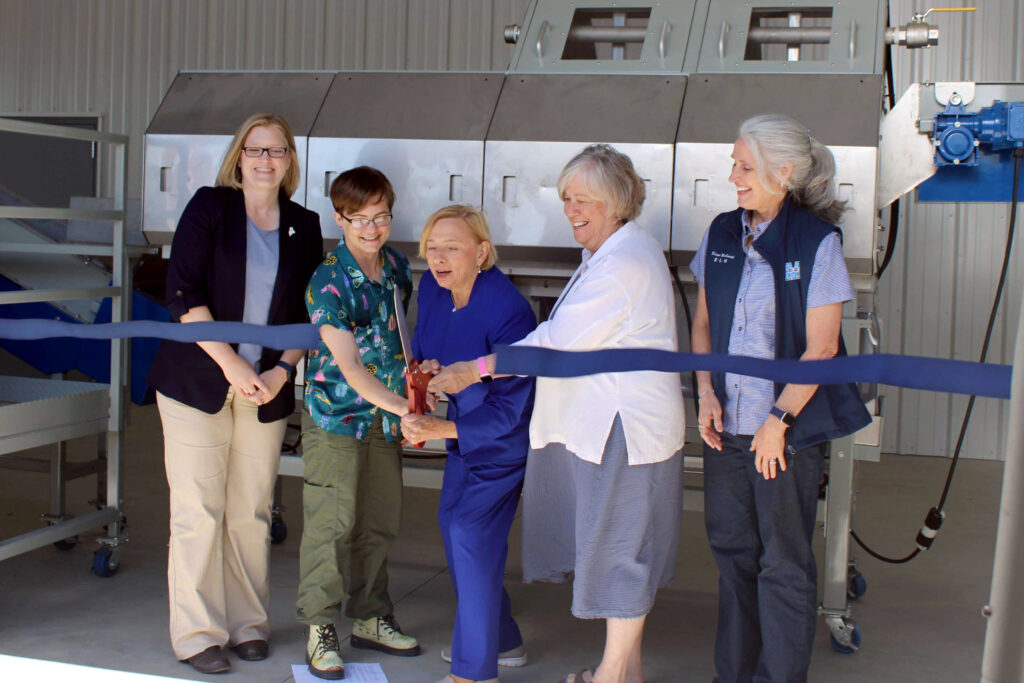
A 2 1/2-foot drone hovered over a field of white, pink and lavender potato blossoms, ushering in a new era for Maine’s potato industry: the opening of a $3 million research lab at the University of Maine’s Aroostook Farm in Presque Isle.
For more than a century, the farm has been helping create new potato varieties with its breeding program. In 1932, the Katahdin debuted after being developed there. Now, the new lab will use technology to help scientists create potatoes for the future.
The Presque Isle facility is the core of UMaine’s potato development efforts, and one of its greatest success stories, the Caribou Russet, came under former leader Greg Porter.
Last year, the University of Maine System provided $3 million so the farm could turn a former storage building into a research hub under the direction of new breeding program director Mario Andrade.

On Friday, more than 40 university and industry leaders turned out for an official opening ceremony, including Maine Gov. Janet Mills.
The upgraded lab will help ensure Maine continues to grow its potato industry, UMaine President Joan Ferrini-Mundy said.
“This is now a $1.3 billion industry for the state of Maine, supporting more than 6,500 good jobs, many of them right here in The County,” she said. “Amid changing climate and markets, our state is increasingly reliant on R&D like that that happens at the University of Maine, like that that led to the Caribou Russet.”
Founded in 1914, the 425-acre Aroostook Farm is one of several sites of the university’s Maine Agricultural and Forest Experiment Station. At more than 600 test plots, faculty, students and farm staff do the painstaking work of pollinating new plants, studying growth, observing pests and diseases and recording a multitude of data.
It typically takes 10 to 12 years to develop a potato variety, but the new lab’s advanced equipment will get researchers where they want to be faster, said Diane Rowland, UMaine’s dean of the College of Earth, Life and Health Sciences and experiment station director.

Scientists will use equipment like X-rays, advanced imaging, chemical sensors and even drones, which she called “absolute game-changers.”
UMaine doctoral student Salem Ermish will work with the drone program on the farm, concentrating on disease identification. Originally from North Carolina, Ermish plans to stay in Maine.
The drones will be able to fly over test plots, showing scientists stages of growth and any disease development. The detailed imagery can help pinpoint disease development early and can help breeders develop plants with the best genetic qualities, Ermish said.
Funding for the new lab came from the Maine Jobs and Recovery Plan, Mills said.
“This is exactly the type of payoff we were envisioning,” she said. “So with tools like drones that will fly over this farm’s nearly 6,000 test plots, students like Salem can now better determine which potato variety is most resistant to weather and to pests and disease.”
Overall, the center’s technology will collect details on each individual potato to help staff evaluate crop strengths: yield, skin, pest vulnerability, climate resistance, frying quality and more, Rowland said.
The Maine Potato Board has been a key partner of the Aroostook Farm for decades and donated the storage building for the lab. Executive Director Jeannie Tapley said the new facility is more than just technology — it’s a down payment on the future of Maine potatoes.

“These investments made here will help grow the next Caribou Russet quicker and advance the next generations of researchers necessary for our industry to adapt and continue producing the highest quality of potatoes in the world right here in Maine,” she said.
Following an official ribbon-cutting ceremony, guests were invited for a brief tour of the lab and a drone demonstration led by Ermish.
Correction: An earlier version of this article misstated the lab’s cost.







